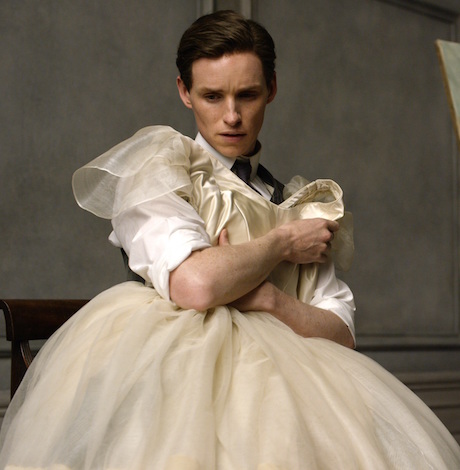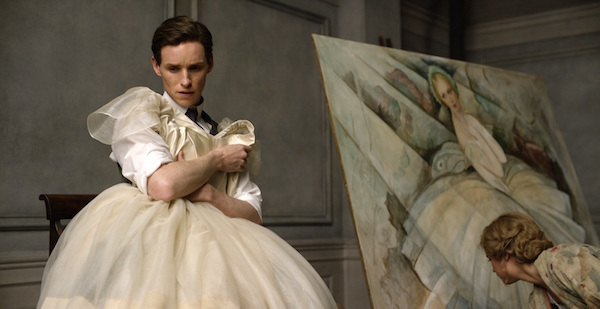Arts & Entertainment
‘Danish Girl’ masterfully realized
Trans-themed biopic is A-lister Oscar bait

It all starts out in one seemingly ordinary moment.
Prima ballerina Ulla is once again late for a sitting with portraitist Gerda Wegener (Alicia Vikander). Frustrated, Gerda asks her husband, famous landscape artist Einar (Eddie Redmayne), to sit in for their friend since she’s only working on the delicately extended foot. It opens today (Friday, Dec. 11) in the D.C. area.
Einar puts on the stockings, crams his feet into the slippers and holds the dress against himself as Gerda picks up her brushes and starts to paint. Einar slowly begins to caress the fabric as long-suppressed thoughts and emotions begin to emerge. Thus begins a remarkable journey for a devoted couple and a remarkable collaboration for a talented cinematic team.
Based on the largely forgotten true story of transgender pioneer Lili Elbe, one of the first people to undergo gender-reassignment surgery, “The Danish Girl” is an exceptional film. Director Tom Hooper (“The King’s Speech” and “Les Misérables”) coaxes powerful performances out of his top-notch cast and collaborates smoothly with his entire creative team.
The movie, set mainly in Copenhagen and Paris in the 1920 and 1930s, looks splendid. Working seamlessly with cinematographer Danny Cohen and production designer Eve Stewart, Hooper makes the most of place and period, contrasting the rigid lines of Copenhagen (and Einar’s harsh airless landscape paintings), with the color and light of Art Nouveau Paris which supports Gerda’s emergence as an artist and Lili’s emergence as a women.
The script by Lucinda Coxon, based on the novel by David Ebershoff, is supple and sensitive, as eloquent when the actors are silent as when they are speaking. Several key sequences unfold wordlessly. Coxon does a marvelous job balancing contemporary sensitivities about gender with the realities of the time period. With incredible subtlety, she makes it clear that Lili is not gay man in drag or a straight man donning a costume, but a woman becoming her true self.
Redmayne’s performance is even more powerful than his Academy Award-winning portrayal of wheelchair-bound scientist Stephen Hawking, due in part to a stronger script and cast. With the support of movement choreographer Alexandra Reynolds, who also worked with him on “The Theory of Everything,” Redmayne has developed an amazingly detailed physical vocabulary that guides him from the rigid mask of masculinity that constricts Einar to the freer expression of femininity that allows Lili to flourish. Redmayne also displays an emotional vulnerability and transparency that makes Lili’s journey incredibly compelling.
Vikander’s performance as Gerda is equally stunning and multi-faceted. As the movie opens, Gerda is deeply in love with Einar, but is also somewhat jealous of his success. He has found artistic satisfaction and popular acclaim with his detailed landscapes; she is frustrated with her attempts at conventional portraiture. When she convinces Einar to pose for her dressed as a woman, it starts as a game, but it quickly turns more serious. She finds a life-long muse, but ultimately loses a husband. With her cigarette holder clenched tight, sometimes in concentration, sometimes in frustration, sometimes in flirtation, Vikander (“Ex Machina”) brings a fascinating character to incandescent light.
The supporting cast is also excellent. Amber Heard (“Magic Mike XXL”) is a delightful find in the surprisingly pivotal of Ulla. The hard-working but fun-loving ballerina serves as a godmother of sorts to the emergent Lili. Her character helps to establish the strong bond between Einar and Gerda, but she is also the first to recognize Lili in public and recommends the clinic where Lili can finally find supportive care. Heard’s light-hearted performance brings a welcome humor and humanity to the proceedings.
Matthias Schoenaerts (“Far From the Madding Crowd”) is sleek and dapper as Parisian art dealer Hans Axgil, a childhood friend of Einar’s who helps Lili and Gerda through their transitions. Out actor Ben Whishaw (“Spectre,” “Suffragette,” “In the Heart of the Sea”) is engaging as a gay bohemian who initially misunderstands Lili’s intentions, but then becomes a supportive friend and guide. Adrian Schiller is charming as the windy but well-connected art dealer Rasmussen and Sebastian Koch is warm and wise as the doctor who finally comes to Lili’s rescue.
“The Danish Girl” may well be the finest LGBT release of 2015, although the year it is not over yet. It is definitely already in contention for well-deserved recognition in the 2016 awards races. Director Tom Hooper and a talented cast and crew have cast a powerful light on a little-known piece of LGBT history, and their moving and beautiful movie makes us reflect on how we are still learning about the mysteries of the human spirit.
Out & About
Plan your wedding the LGBTQ way
Washington D.C. LGBTQ+ Wedding Expo scheduled for Sunday

Rainbow Wedding Network will host “Washington D.C. LGBTQ+ Wedding Expo” on Sunday, March 1 at 12:30 p.m.
Guests can meet and mingle with a curated selection of LGBTQ-welcoming wedding professionals from across the region, each ready to help bring your vision to life, and spend a beautiful afternoon exploring everything they need to create a celebration that reflects them.
There will be a relaxed, self-guided look at the Watergate’s spaces and amenities, savor signature cocktails and delicious tasting samples, and connect with other couples who are on the same journey.
Visit Eventbrite to reserve a spot.

Friday, February 27
Center Aging Monthly Luncheon With Yoga and Drag Bingo will be at 12 p.m. at the DC Center for the LGBT Community. Email Mac at [email protected] if you require ASL interpreter assistance, have any dietary restrictions, or questions about this event.
Go Gay DC will host “LGBTQ+ Community Happy Hour Meetup” at 7 p.m. at Freddie’s Beach Bar and Restaurant. This is a chance to relax, make new friends, and enjoy happy hour specials at this classic retro venue. Attendance is free and more details are available on Eventbrite.
Trans Discussion Group will be at 7 p.m. on Zoom. This group is intended to provide an emotionally and physically safe space for trans people and those who may be questioning their gender identity/expression to join together in community and learn from one another. For more details, email [email protected].
Saturday, February 28
Go Gay DC will host “LGBTQ+ Community Brunch” at 11 a.m. at Freddie’s Beach Bar & Restaurant. This fun weekly event brings the DMV area LGBTQ+ community, including allies, together for delicious food and conversation. Attendance is free and more details are available on Eventbrite.
The DC Center for the LGBT Community will host “Sunday Supper on Saturday” at 2 p.m. It’s more than just an event; it’s an opportunity to step away from the busyness of life and invest in something meaningful, and enjoy delicious food, genuine laughter, and conversations that spark connection and inspiration. For more details, visit the Center’s website.
Black Lesbian Support Group will be at 1 p.m. on Zoom. This is a peer-led support group devoted to the joys and challenges of being a Black lesbian. You do not need to be a member of the Beta Kappa Chapter or the Beta Phi Omega Sorority in order to join, but they do ask that you either identify as a lesbian or are questioning that aspect of your identity.Send an email to [email protected] to receive the zoom link.
Sunday, March 1
LGBTQ+ Community Coffee and Conversation will be at 12 p.m. at As You Are. This event is for people looking to make more friends and meaningful connections in the LGBTQ community. Attendance is free and more details are available on Eventbrite.
Monday, March 2
“Center Aging: Monday Coffee Klatch” will be at 10 a.m. on Zoom. This is a social hour for older LGBTQ+ adults. Guests are encouraged to bring a beverage of choice. For more information, contact Adam ([email protected]).
Tuesday, March 3
Universal Pride Meeting will be at 7 p.m. on Zoom. This group seeks to support, educate, empower, and create change for people with disabilities. For more details, email [email protected].
Wednesday, March 4
Job Club will be at 6 p.m. on Zoom upon request. This is a weekly job support program to help job entrants and seekers, including the long-term unemployed, improve self-confidence, motivation, resilience and productivity for effective job searches and networking — allowing participants to move away from being merely “applicants” toward being “candidates.” For more information, email [email protected] or visit www.thedccenter.org/careers.
Center Aging Women’s Social and Discussion Group will be at 6 p.m. on Zoom. This group is a place where older LGBTQ+ women can meet and socialize with one another. There will be discussion, activities, and a chance for guests to share what they want future events to include. For more information, email [email protected].
Thursday, March 5
The DC Center’s Fresh Produce Program will be held all day at the DC Center for the LGBT Community. People will be informed on Wednesday at 5 p.m. if they are picked to receive a produce box. No proof of residency or income is required. For more information, email [email protected] or call 202-682-2245.
Virtual Yoga Class will be at 7 p.m. on Zoom. This free weekly class is a combination of yoga, breathwork and meditation that allows LGBTQ+ community members to continue their healing journey with somatic and mindfulness practices. For more details, visit the DC Center’s website.
a&e features
Transmission DC breathes new life into a storied sound space
A fresh home for boundary-pushing culture on H Street

Late last year, phoenix-style, a fresh home for boundary-pushing culture arose on the H Street corridor. Transmission DC – a queer, trans, and POC-owned, operated, and centered community-focused venue – powered on in the former home to the Rock & Roll Hotel (famously, not a hotel, but very much rock & roll). Transmission (1353 H St., N.E.) arrives secure in its mandate – or even birthright – to provide a place to celebrate creativity and music through a lens of inclusivity and respect.
Transmission’s team brings experience, but also representation. Owners/partners Kabir Khanna (who is also programming director), Katii B, Ellie McDyre, and Kelli Kerrigan together previously managed 618 productions, a venue in Chinatown, crafting “some of D.C.’s freakiest parties, raves, and mosh pits” they note.
They packed up operations last fall to a space curated specifically for D.C.’s underground music and culture scene, building their efforts in Chinatown to bring in more fans in queer and POC circles.
Transmission, Khanna points out, is built on DIY values. In the music scene, DIY means that promoters and organizers – often disconnected from the mainstream and part of marginalized communities – build shows and programs collaboratively, but independently from institutions, supporting each other as smaller, independent venues close. Here, Transmission aims to ensure that those putting together these underground inclusive shows have a more permanent and stable home, can have access to resources, and can provide more sustainable income to artists. “We’re trying to get more people to support and enjoy the music, and also give artists and organizers within the DIY community more structure and a larger cut,” says Khanna.
Khanna also notes that Transmission operates “under the principles of safety, inclusivity, and respect.” McDyre added that even at venues that claim inclusivity, that statement might not take place in practice. We’re “not just pitting up a rainbow flag,” says McDyre, but as some of the owners are trans and POC, audiences can see themselves reflected at the top.
Much like the DIY nature of the music community, the Transmission owners brought a DIY ethos to turning around their space.
In March 2020 – the height of COVID lockdowns – Rock & Roll Hotel suddenly shuttered, though not due to the pandemic; instead, the venue claimed that decreasing sales and increasing competition led to the closure. For 14 years, it was the central spot for cheap beer and lesser-known and celebrated acts. The space stood vacant for more than five years, until Transmission turned the power back on.
“When we got into the space, it was effectively abandoned for years,” says Khanna. “There was a ton of mold, and paint primer covering all surfaces. It was nearly falling apart.” Khanna noted that many music venues like this one, regardless of how well it was maintained, “get the shit kicked out of it,” given the nature of shows. The team called in mold removal contractors, ripped up most of the floorboards, and started fresh.
Transmission’s first floor is styled as a stripped-down black box: the better to take in the music. “It’s minimal on purpose to act as a canvas for set design and music,” without a specific aesthetic, says Khanna. Moving upstairs, the second floor has been opened up, removing some walls, and now has a larger dance area than the first floor. Beyond the first two performance levels, and a holdover from Rock & Roll Hotel, is the rooftop. Though without a stage, the rooftop space is filled with murals splashed across the walls, with a full bar. Transmission’s current capacity is 496, but the team is looking to grow that number. Transmission will also leverage the full kitchen that Rock & Roll Hotel operated, bringing in Third Hand Kitchen to offer a variety of food, including vegan and vegetarian options.
Khanna pointed out an upcoming show reflective of Transmission’s inclusive ethos: Black Techo Matters on Feb. 27. The event is set to be “a dynamic, collaborative night of underground electronic music celebrating Black History Month.” Khanna says that techno came from Black music origins, and this event will celebrate this genesis with a host of artists, including DJ Stingray 313, Carlos Souffront, and Femanyst.





















